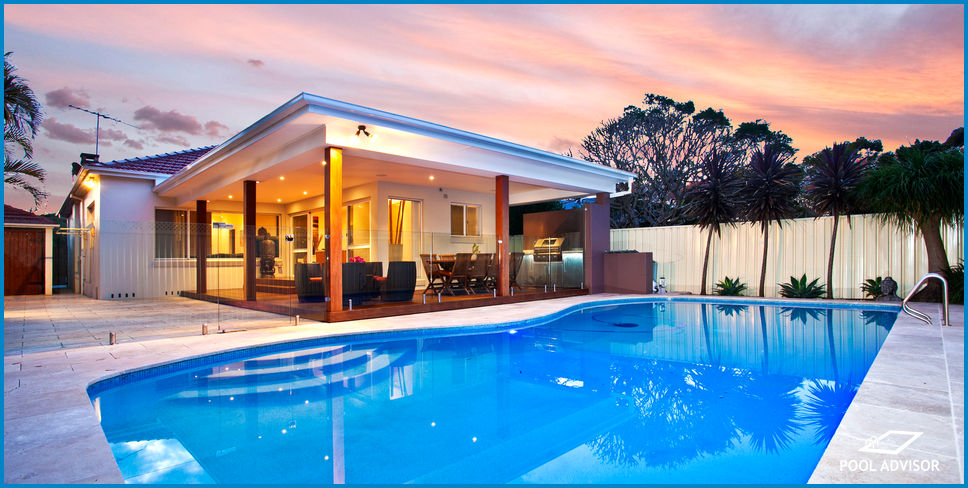
Mineral Pools vs. Chlorine Pools - Which Should You Get In Australia?
While traditional chlorine pools have been a trusted option for at-home pool owners for over a century, mineral water pools have been garnering attention in the last decade for their therapeutic properties.
These pools also boast the use of less chlorine, which is appealing to many water-lovers who get sick of the chemical smell.
In this article, we will review how these types of pools work differently, compare them across different categories such as upfront cost, maintenance, and water quality. Read on to decide if mineral water pools or chlorine pools make the best fit for you and your budget.
How Do Mineral Pools Work?
Mineral pools work by maintaining adequate levels of sodium chloride, magnesium chloride and potassium chloride, trading the high amount of salt used in salt water pools for a more balanced mixture of natural minerals.
These mineral compounds are introduced by a mineral water system, and through interactions with your water release their mineral components as well as free chlorine. These components work to sanitise your pool in place of higher amounts of added chlorine.
Many mineral water systems are also designed to include the use of copper and silver ions in the water for sanitisation as well, which strengthens your pool’s defences against microorganisms like bacteria and algae.
How Do Traditional Chlorine Pools Work?
Traditional chlorine pools rely on maintaining a consistent chlorine level. The recommended amount of chlorine in a pool is between 2-4 parts per million (ppm), which is necessary in order to provide effective sanitation.
Chlorine pools can experience rapid chlorine loss without the use of stabilising products. When pool water with unstable chlorine is exposed to sunlight for a long duration, it disintegrates and becomes ineffective.
This makes stabilised chlorine vital for anyone managing an uncovered, outdoor pool.
Comparison: Mineral Pools vs. Chlorine Pools
Upfront Costs
Mineral water systems carry a slightly higher startup cost than chlorine pools. Because these machines typically already contain the required mineral stores to acclimate your pool water to its new levels, you will not need to purchase as many chemicals upon setup. Most mineral water systems are easily installable without the help of specialists.
Mineral water systems start at a reasonable price of around $300, and these are capable of handling most family sized swimming pools. If you have an exceptionally large pool or are looking for top-of-the-line quality, you can find models available that cost $1,500 or more.
Chlorine pools have a marginally lower startup cost than mineral pools because they do not necessitate the purchase and installation of a mineral water system. Although there is less initial investment involved, you will still need to purchase a large, initial dose of chlorine to raise your water to a level between 2-4ppm.
In a pool with 50,000 litres of fresh water, approximately 270 grams of stabilised chlorine powder will allow you to achieve 3ppm, which is within the ideal range of 2-4ppm. This is around 55g per 10,000L, or otherwise according to your specific product’s packaging.
Running Costs and Maintenance
Mineral water pools are mostly self-sufficient compared to chlorine pools, and usually only require that mineral packs be replaced on a yearly basis. Other mineral water systems contain cartridges with a longer lifespan, with some models lasting more than three years at a time relative to your pool’s volume.
Mineral pools contain a larger amount of dissolved trace minerals and metals in your water. While these particles are safe for swimmers and extremely efficient at sanitation, they can occasionally form scale or metal staining.
Stains often form as the end result of a chemical interaction involving pool chemical treatments and the dissolved minerals in your water, but scale and stains can also build up over time. Stain inhibitors are often used to prevent stains from developing in a mineral water pool.
Certain mineral water pool systems will also require the use of added chlorine, although the amount of chlorine needed is estimated to be less than a third of what would be required in a chlorine-only pool. There is also less need to add stabilisers to a mineral water pool than a chlorine pool.
Health Benefits and Water Quality
Mineral water pools contain magnesium, an element that is essential for maintaining healthy levels of stress and structural support in the musculoskeletal system. Magnesium is typically used in the form of vitamins or as epsom salts used in bath water.
Swimming in mineral pools allows magnesium and the other trace minerals to be absorbed through the skin, which can have a variety of health benefits. This is one of the main benefits of a magnesium pool.
Mineral water pools typically have a softer quality of water than traditional chlorine pools due to the presence of dissolved potassium and sodium in the water. Not all people are able to notice this difference when swimming in pools with mineral water.
Chlorine pools are a perfectly safe and sanitary option for you and your family to use, but they are not known to carry any health benefits associated with the water quality. Chlorine is known for being somewhat harsh on the skin, especially for those with sensitive or chronically dry skin.
Mineral pool water, on the other hand, is not known to be drying.
Main Differences
Mineral water pools have a slightly higher startup cost than chlorine pools due to the purchase of a mineral water system. However, other than this initial investment, many mineral water systems provide cheaper maintenance in the long run.
Although mineral water systems carry a slightly higher risk of metal staining and calcium scale buildup, we think that the water quality, general ease of maintenance, and health benefits are worth taking the chance.
Conclusion
Both mineral water pools and traditional chlorine pools are efficient at keeping your pool free from bacteria and algae growths and ready to be enjoyed by your swimmers.
While traditional chlorine pools have a long track record, mineral water pools are gaining popularity among home pool owners in recent years for their therapeutic effects.
Do you need anything cleared up about the differences between chlorine pools and mineral water pools? Drop us a question in the comment section!
Alternatively, check out this comparison of saltwater and chlorine pools.

Louis
A chemical engineer by trade, Louis is committed to debunking myths in the pool industry by explaining the underlying chemistry and making it accessible to all.
